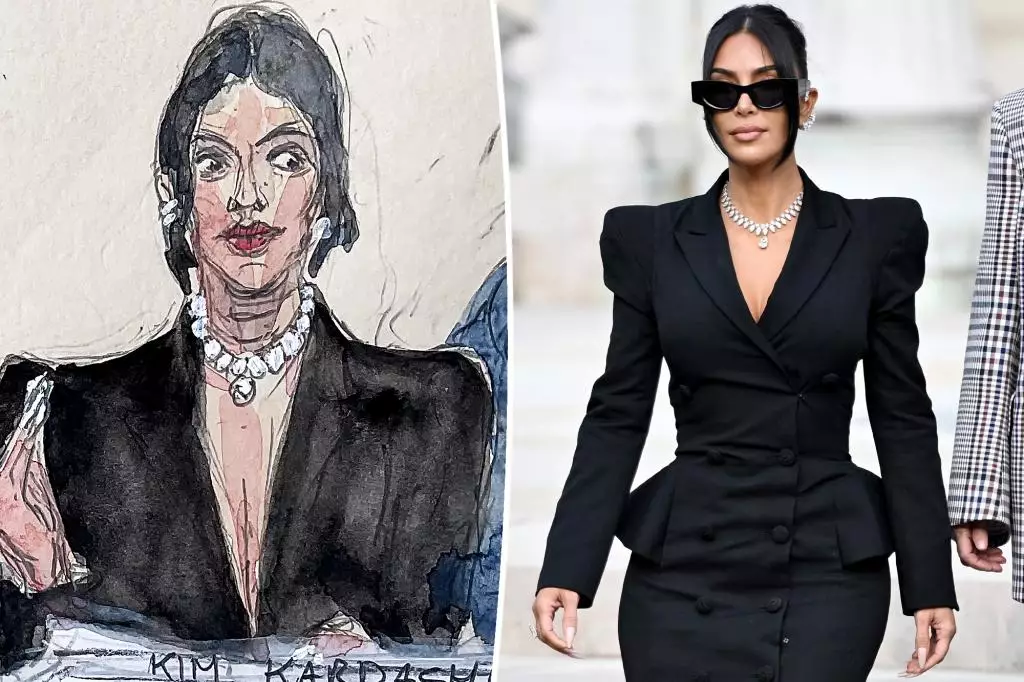In a case that gripped the world, a Paris court recently delivered a verdict concerning the infamous heist of Kim Kardashian’s jewelry—a brazen crime that shook not only the celebrity landscape but also brought focus to the complexities of justice, victimization, and accountability. Eight individuals, part of a group dubbed the “grandpa robbers,” were found guilty, revealing the convoluted interplay between crime and age, as well as the dark realities of fame.
The notorious heist occurred in October 2016 during Paris Fashion Week, a high-profile event bustling with glamour and wealth, when Kardashian was targeted and robbed of approximately $10 million worth of jewelry. The lead suspect, Aomar Aït Khedache, received an eight-year prison sentence, with five years suspended, highlighting judicial leniency, perhaps due to the advanced ages of the perpetrators—most in their 60s and 70s. This raises intriguing questions about societal perceptions of justice for older individuals, and whether punishment should fit not just the crime, but also the life lived.
Victim’s Voice: Kim Kardashian’s Unyielding Spirit
Kardashian’s response to the verdict was both reflective and empowering. She stated, “The crime was the most terrifying experience of my life, leaving a lasting impact on me and my family.” This insight into her perspective underscores the long-lasting trauma victims endure, often overshadowed by the sensationalism of the crime itself. It transcends beyond mere celebrity gossip; it speaks to the vulnerability that even prominent figures can face.
Her acknowledgment of the importance of growth and accountability showcases a nuanced understanding that while justice is crucial, recovery and healing are integral for victims. She expressed gratitude towards French authorities for their pursuit of justice, illuminating the sometimes daunting path victims navigate amid the complex legal landscape. Kardashian not only seeks closure for herself but advocates for systemic change in the criminal justice system, revealing her commitment to use her platform for greater societal benefit.
The Irony of Age in Crime
What stands out in this verdict is the irony associated with the demographics of the offenders. Perpetrators in their twilight years involved in a multimillion-dollar jewel theft raises questions about the motivations behind such acts. Is it desperation, thrill-seeking, or perhaps a distorted sense of entitlement? The court’s leniency based on age could suggest a societal inclination to forgive the elderly, yet simultaneously points to a troubling narrative about crime’s allure, regardless of age.
The decision to suspend lengthy prison sentences also reflects a broader attitude that, perhaps due to age, these individuals are unlikely to reoffend. However, one must ponder whether this leniency skews justice for the victims. Does it communicate that certain individuals, based on age, might escape severe consequences for grievous actions, and what message does that send to society, particularly to victims who suffer the aftermath?
The Haunting Experience: A Survivor’s Testimony
Kardashian’s detailed recounting of the robbery served as haunting evidence of the psychological and emotional scars left in the wake of such incidents. Her intimate portrayal of the fear she experienced—“I absolutely thought I was going to die”—illustrates the very real consequences of crime beyond the monetary loss. It compels a broader discussion on how crime, especially of this nature, creates lasting trauma for victims, fundamentally changing their perception of safety and trust.
The gravity of her words encapsulates the chilling reality of surviving traumatic experiences, igniting empathy and a call for more comprehensive support systems for victims. Kardashian’s willingness to narrate her traumatic encounter in a courtroom exemplifies not only personal bravery but also a commitment to advocating for deeper discussions about victim rights within the justice system.
While the verdict may mark a chapter in the saga of Kim Kardashian’s robbery ordeal, it also serves as a catalyst for discussions surrounding criminal justice reform, victims’ rights, and the societal treatment of elderly offenders. In engaging with her experience, Kardashian transforms from a mere victim into an advocate for change, emphasizing the need for a legal system that prioritizes the voices and recoveries of those it impacts most profoundly. The world watches closely as she continues to navigate her role, not just as a celebrity but as a significant player in the conversation surrounding justice, empathy, and resilience.

